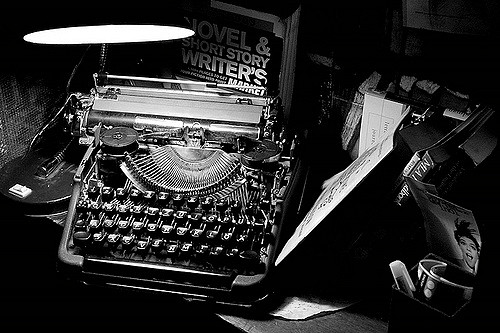
A writer’s desk is a sacred space. It’s where the magic happens. Ideas become words, and words become stories. And sometimes those stories go out into the world and do great things. But every writer needs a few tools to make that happen.
1. A Killer Planner
If you’re writing to pay the bills, you’ve got to stay organized, whether that means you need an editorial calendar for your blog, a way to keep track of projects and clients, a daily to-do list, a system of tracking word count goals, or all of the above. A freelancer with income and expenses on the brain might need something like The Freelancer Planner. A novelist in need of structure might try The Novel Planner. For freedom to develop a unique system, grab a sketchbook and do your own thing! Just have something open to the correct page when your meeting with Big-Time Publisher comes along. You do not want to miss that.
2. The Perfect Pen and Journal for Those Days
Computers are great. They let us type faster, share more, and work with unbridled flexibility. But some days, you just need a pen. The feeling of ink flowing over your favorite paper, your own handwriting looking up at you. Sometimes you need to connect with the words on a personal level. When that happens, you’re going to need some tools. My go-to pen is the Sharpie Stainless Steel Pen, but some people like the feel of a ballpoint pen or even (gasp) pencil. Whatever gets the words flowing. Tool number two is a notebook that inspires you to fill it up. For me, that’s anything bound in leather, with natural-feeling pages. If your thing is a yellow legal pad or a large oak leaf, go for it.
Yeah, it’s a little gimmicky. A book. In the shape of a block. But come on, every hard-working writer needs to lighten up every now and then. Plus, it really is useful. Each page has an exercise or prompt to get your creative juices flowing. The excuse, “I didn’t know what to write about,” goes out the window.
4. A Writing Program
Writing technology has come a long way since typewriters, and I’m not just talking about keyboards. Word processors are great, but if you really want to take advantage of your computer’s writing power, you need a dedicated program. I am a strong advocate of Scrivener. This thing is the real deal. Whether you’re writing a short story, novel, academic paper, recipe book, or guide to eating with chopsticks you will find the features you need in Scrivener. It’s the perfect way to organize your thoughts and keep everything you need for each project in one place. Plus, the compile and export features are brilliant and easy to use.
While Scrivener and I have a happy, monogamous relationship, I’ve also heard good things about Ulysses, which also has an iPhone/iPad app. Other programs you might try are Evernote (free), Gingko (outline/notecard style), yWriter (basic functionality, PC-only), Storyist (Mac-only), and Scapple (best for notetaking).
5. A Superstar Coffee Mug
Every caffeine-addicted writer needs a creative coffee mug! Maybe this Monster Mug for a horror writer. Or this one if you’re lonely. Tea drinkers can enjoy this sprouting infuser. And every writer needs this mug!
Now you have the tools to inspire you and make your time count. The days of Newton’s cradles and desktop zen gardens cluttering your precious writing space are over. Your desk is now a haven of inspiration and productivity. So go forth, and write!



